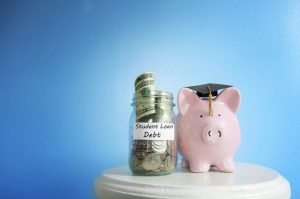Student Loan Debt 'Cancellation' May Feel More Like 'Law School Coupon Day' For New Lawyers
Despite a lot of talk, very few people have done anything tangible to address the student debt crisis in the legal profession.
 It is very difficult to get accurate information about typical student loan debt figures for new attorneys. It’s almost as if the institutions that directly reap the tremendous financial rewards of all those loans — and are also best positioned to accurately collect student debt information — don’t want potential law students to be fully informed about what they are getting into.
It is very difficult to get accurate information about typical student loan debt figures for new attorneys. It’s almost as if the institutions that directly reap the tremendous financial rewards of all those loans — and are also best positioned to accurately collect student debt information — don’t want potential law students to be fully informed about what they are getting into.
At any rate, one of the better ways at present to find out what new lawyers owe is to ask them, and the ABA did just that for a survey it released in 2020. Among a hopefully representative sample of just over 1,000 young lawyers and recent law school graduates, the ABA found that the average total student debt load for an individual student was $164,742 at graduation.
The median amount owed was even higher than the average, which is probably not a big surprise given that nearly one in three law school graduates reported finishing school more than $200,000 in debt. Dishearteningly, the average student loan balance for survey respondents was higher at the time they took the survey than it was at graduation, at $171,036. There is, of course, interest on loans, and the interest rates on many types of student loans are fairly oppressive within the present context of generally low interest rates in almost every other segment of society.

Legal AI: 3 Steps Law Firms Should Take Now
I’ve written a lot of stuff about law school student loan debt over the years, including a book about how to potentially avoid it entirely. In the course of all that writing, it was pointed out to me, accurately, that law school graduates do have lower rates of default on student loan obligations than do matriculants in many other types of graduate programs. But the fact that a good proportion of those with JDs eventually pay off the heinous sums they incurred to go to law school is not exactly a sign of success. Even if the debts, one day, are paid off, oppressive attorney debt loads are ruinous to the legal profession. Huge debt totals take far too many good lawyers out of public interest work only to deposit them squarely in thrall to corporate overlords, huge debts make all of us (even more) miserable, and ultimately huge student debt loads hurt the interests of the regular people lawyers and the legal system are supposed to protect.
Despite a lot of talk, very few people have done anything tangible to address the student debt crisis in the legal profession. If you ask me, there’s too much money for a lot of powerful people in doing nothing. Yet, the whisper of student loan forgiveness under the Biden administration has brought a slim ray of hope to some law school grads.
Senator Elizabeth Warren sponsored a bill which would cancel up to $50,000 in student loan debt for individual borrowers — at least those with an annual adjusted gross income under $100,000. That seems very unlikely to pass though. President Joe Biden does not have the greatest record on student debt forgiveness. He did say at a February town hall that he supported forgiving as much as $10,000 in student loan debt per borrower.
That would be a start, and better than nothing. Still, Biden couched saying he’d forgive up to ten grand in student loan debt with the caveat that he didn’t support any student loan forgiveness for those who attended elite schools. Which sort of makes sense: those who attend elite schools tend to come from money in the first place, and often end up making a great deal more of it after graduation. Even so, a non-zero portion of every law school class, including at elite schools, is left behind economically. The word “Harvard” on your law school transcript is not necessarily a ticket to guaranteed success, although it’ll have cost you at least $67,081 on tuition for three years nonetheless.
Sponsored

Navigating Financial Success by Avoiding Common Pitfalls and Maximizing Firm Performance

Early Adopters Of Legal AI Gaining Competitive Edge In Marketplace

Is The Future Of Law Distributed? Lessons From The Tech Adoption Curve

Navigating Financial Success by Avoiding Common Pitfalls and Maximizing Firm Performance
And let’s say the average law student really does have $164,742 in debt at graduation. Forgiving $10,000 of that is only a 6% discount. You’d get a better discount signing up for DoorDash.
Just forgiving student loan debt is not the solution the legal education system deserves. What we really need is a better legal education marketplace, where law schools function less like ATMs for their affiliated institutions. Until that happens, some student loan debt forgiveness, for some attorneys, would at least be a temporary salve. I hate to break it though: a 6%-off coupon for law school isn’t going to cut it.
Jonathan Wolf is a civil litigator and author of Your Debt-Free JD (affiliate link). He has taught legal writing, written for a wide variety of publications, and made it both his business and his pleasure to be financially and scientifically literate. Any views he expresses are probably pure gold, but are nonetheless solely his own and should not be attributed to any organization with which he is affiliated. He wouldn’t want to share the credit anyway. He can be reached at jon_wolf@hotmail.com.
Sponsored

Legal AI: 3 Steps Law Firms Should Take Now
